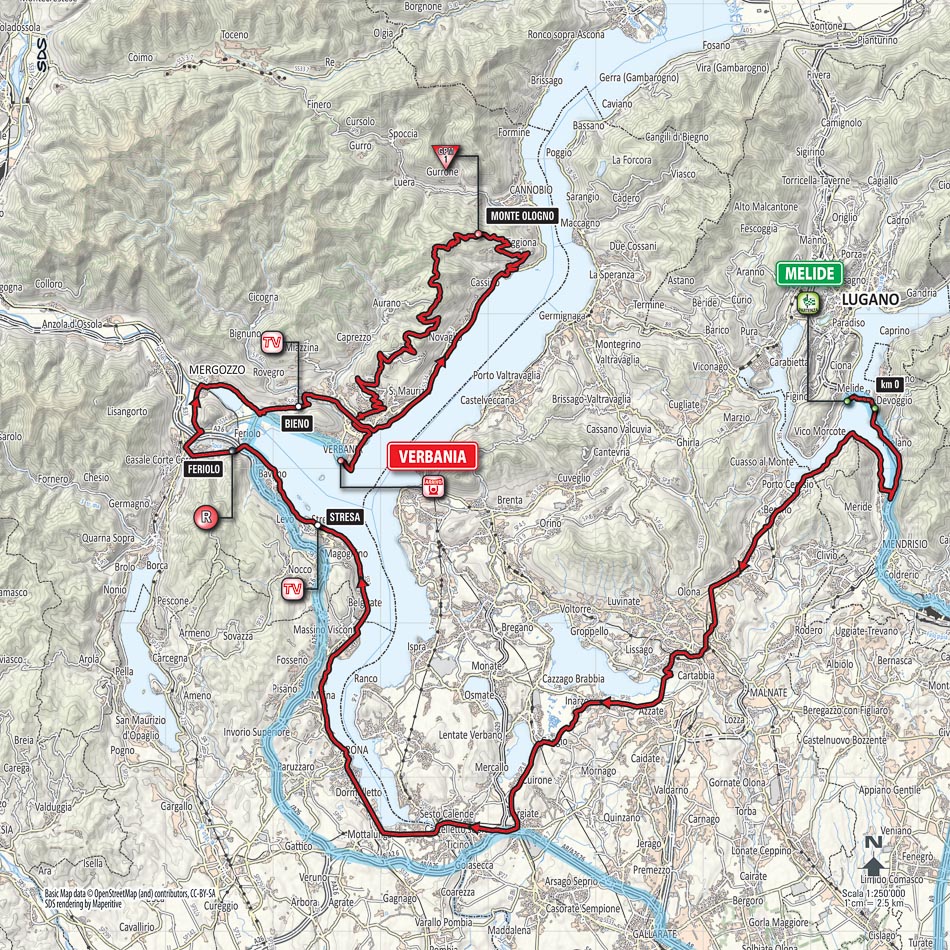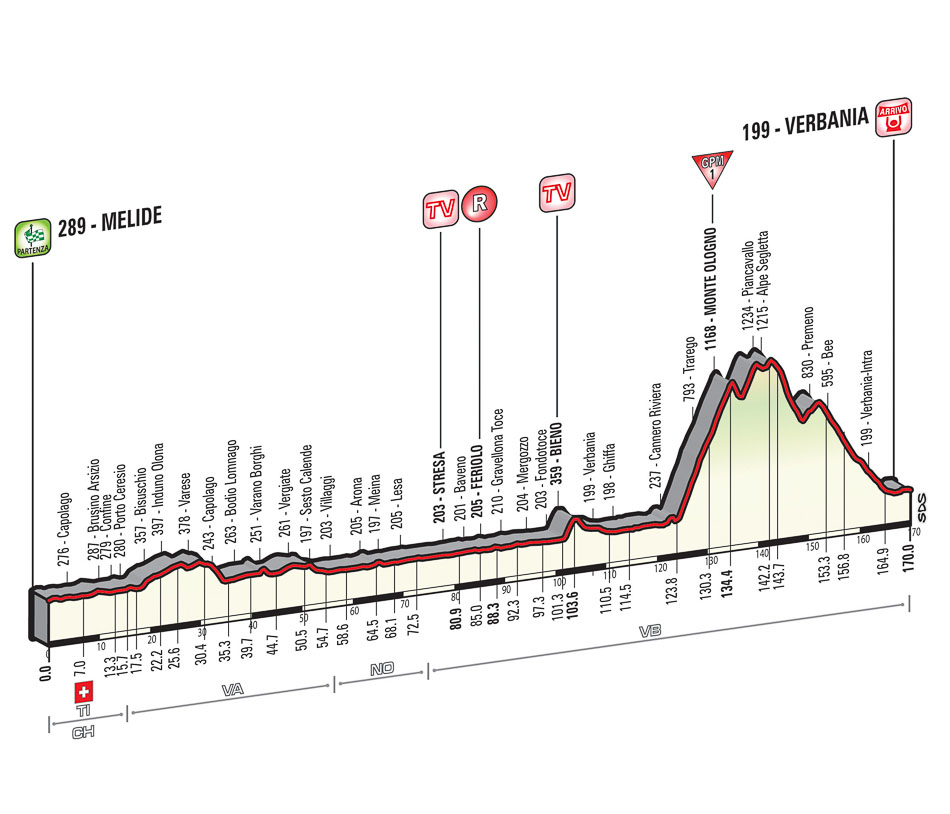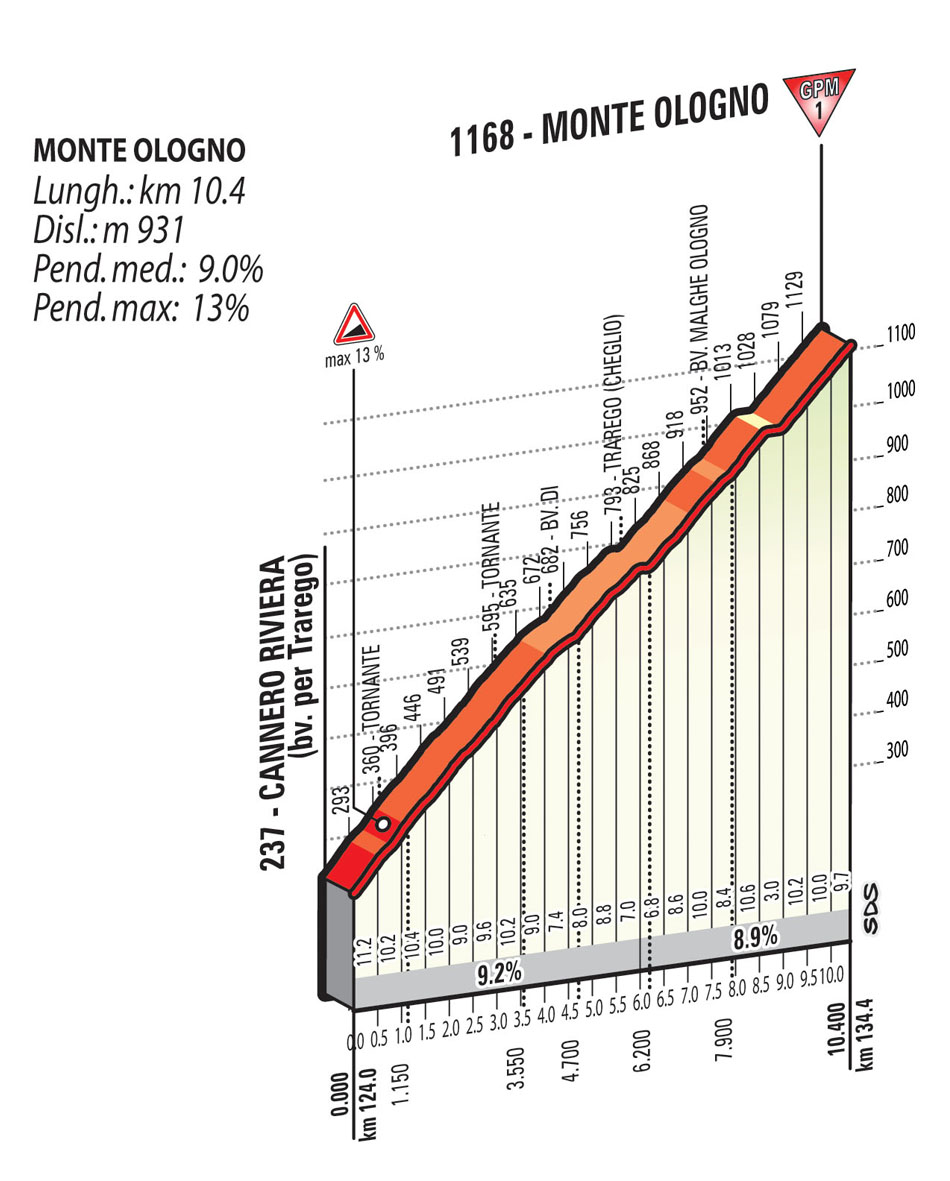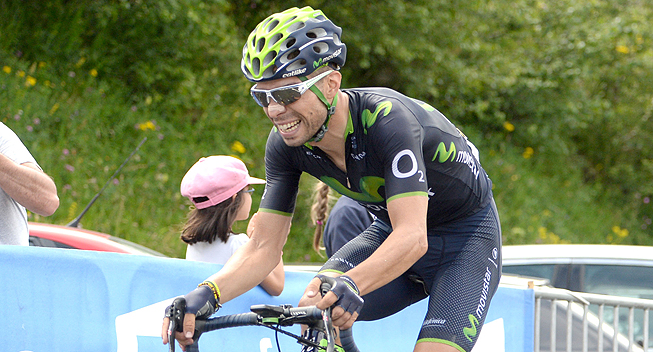The GC riders got a chance to take a small breather in today’s largely flat stage but from now on there will be no room to rest until the riders have reached Sestriere at the end of the penultimate stage. With three consecutive stages in the mountains, much can still be changed. Ambitious riders get their first chance to move up in tomorrow’s stage 18 which is the easiest of the triptych and as it has breakaway written all over it, it is a huge goal for numerous riders.
The course
After a day in the flatlands, it is back into the mountains for stage 18 which offers a very rough finale and one of the hardest climbs of the race. However, the stage also features a downhill run to the finish and this means that it may not make a very big difference between the best climbers in the race. Instead, many stage hunters have red-circled this stage as maybe their biggest opportunity in the final week.
The 170km stage brings the riders from Melide to Verbania and is clearly divided into two parts. The first, flat 125 km run from Melide along the shores of Lake Lugano lead back to Italy and roll across Varese and Sesto to reach Lake Maggiore. The route skirts around the lake through Arona and Stresa, reaching Mergozzo and Verbania (first time), brushing very close by the finish line. The riders have to watch out for a number of obstacles, such as roundabouts, speed bumps and traffic dividers while crossing urban areas. The route rolls past Verbania and gets to the Monte Ologno ascent that features steep gradients (category 1, 10.4km, 9.0%, max. 13%). It is a very regular climb that leaves virtually no room for recovery and has a pretty constant gradient above 8%. The first part of the descent is curvy and technical but with low gradients. As the stage course reaches Alpe Segletta, the second part is wider and easier. The descent ends 5km from the finish and includes a few small climbs along the way.
The last 17km run along a wide, well-paved downhill road leading from Premeno to Verbania (a former railway with slopes of approx. 5%), up to 5 km from the finish in the built-up area of Verbania (Intra). The route rolls past a few roundabouts and traffic dividers, and eventually reaches the waterfront. The last 3.5km are quite uncomplicated as the riders will just follow a long, slightly winding road, with a sharp turn just after the flamme rouge. The finish line lies on a 200-m long straight, on 6.5-m wide asphalt road, after the riders have tackled a very slight bend.
Verbania has hosted a stage finish twice, most recently in 1992 when Franco Chcioccioli won the stage.



The weather
After the wet second week, the riders enjoyed great sunshine in stage 17 and they will enjoy another beautiful day on Thursday before they will again face some rain in the mountain stages at the end of the race. Tomorrow will be a sunny day with a maximum temperature of 21 degrees which should make it a very pleasant day for the riders.
There will be a light wind from a southerly direction. This means that the riders will mainly have a cross-headwind in the first part before they turn into a crosswind section and then get a tailwind for their run along the lake. There will be a short crosswind section before the riders get to Verbania for the first time. There will mainly me a tailwind in the run-in to the climb where there will be a crosswind. From there it is mainly a headwind back to the finish in Verbania. From the 4km to go mark to the flamme rouge, there will be a direct headwind and then the riders will turn into a cross-tailwind for the final kilometre.
The favourites
For riders that are not pure climbers or sprinters, the third week only offers two opportunities to win a stage. Today’s stage was probably the best chance – even though it ended as a missed opportunity – but tomorrow’s stage may also offer an opportunity for certain riders. However, it won’t be possible for everyone to win this stage as the Monte Ologno is one of the hardest climbs of the entire race. The downhill finale opens the door for a wider range of contenders but to win this stage, one needs to be a very good climber.
For the GC riders, today’s stage was a chance to take a short breather. They will mainly have their eyes firmly fixed on the two mountain stages in the weekend but they will have to keep their eyes out in stage 18. With a downhill finish, it may not be a day to win the race but the Monte Ologno is so hard that it can create some huge damages. If a GC contender is too focused on getting easily to Friday’s mountain stage, he may get an unpleasant surprise in a stage where the race can definitely be lost.
The downhill finish means that this is not a stage that the GC riders can realistically aim for. Furthermore, the final climb is so hard that the sprinters have no chance to survive and if the overall contenders decide to fight for the overall standings, only the very best will be left. Hence, this is the kind of stage that has no clear favourite if the early break is caught and so it is very hard to imagine that the early break won’t make it to the finish. This means that a lot of riders will be very keen to go on the attack and we are destined to have another brutally fast and aggressive start to the stage.
The composition of the stage is completely opposite to stage 17 which started with a tough climb and had a flat finale. This meant that it was very hard to join the right break but several riders had a chance to win from a breakaway if they had made the right move. This time the flat start means that one doesn’t have to be a strong climber to make it into the break and luck will play a much bigger role in determining the group that eventually goes clear. However, the finale is so extremely hard that only very good climbers can win this kind of stage and this makes it a delicate affair. The start favours heavier guys and the early break may end up containing a lot of riders who have to chance to win this kind of stage.
It will probably take a very long time for the early break to get formed as most teams desperately want to be part of the action as it may be their final chance to win a stage. It could easily take more than an hour before the elastic snaps and the group goes clear. When that happens the peloton is likely to take a big breather and allow Tinkoff-Saxo to set a steady pace until the fight for position for the final climb starts.
There is always a chance that a team that has missed the move, tries to bring the break back. The stage is very similar to the one Michael Rogers won in Savona in 2014. Back then, the early break got clear after a brutal start but Androni had missed the move. The Italian team chased hard in the flat section before the climb and so it was all back together on the lower slopes of the ascent. A similar scenario is possible in this stage. However, the riders who can win in this kind of finale, will probably prefer to save their energy for stages 19 and 20 if they have missed the move and so we will be hugely surprised if this stage isn’t won by an early attacker.
In any case, we may see a battle between the GC contenders on the final climb. Astana may again want to try to isolate Alberto Contador and we wouldn’t be surprised to see them go full gas on the Monte Ologno. In fact, this stage may offer them a better chance to gain time on Contador than a real mountaintop finish. If Contador is isolated in the lumpy section at the top of the climb, Landa and Aru can attack him in terrain that is hard to control. However, Contador will have an ally in Andrey Amador who wants to stay in podium contention and it will be hard for the two Astana riders to make a difference. Furthermore, the strategy could backfire as Aru is clearly no longer at his best level and he could be the one to suffer on this tough climb. In any case, it could be a very small group of favourites who tackle the descent whose first part is so difficult that it can be used to make a difference.
It is a difficult affair to pick the winner of this stage as luck plays a huge role in determining the composition in the early break and it will be hard for the tiny climbers who excel in the finale, to join the right move. To win this stage, you have to be a solid all-rounder. With the technical descent and rolling terrain after the climb, there may be time to make up some lost ground and so descending skills and a fast sprint could also come into play.
Giovanni Visconti was expected to be an aggressive presence in this race but as he suddenly found himself near the top of the GC, he decided to stay up there until the time trial. He is 2kg lighter than usual and has always been aiming for a stage win in the third week where he aims at surprising his critics in the high mountains. He has now lost a bit of time and sits 5 minutes off a spot in the top 10 and this may give him the freedom to attack. He already tried in stage 15 and tomorrow he will be eager to try again.
Visconti has all the skills to win this kind of stage. The Italian is a great climber, an excellent descender and very fast in a sprint. He knows how to make it into the right breaks and with a strong Movistar, he could even have a teammate at his side if he joins the right move. The main question is whether the top 10 riders will allow him to go on the attack but if he gets some freedom, he will be hard to beat.
Fabio Felline also fits the bill perfectly. The Italian has always been regarded as a huge talent but we had to wait until 2015 before he finally started to show his full potential. He has been riding at a very high level all year and he doesn’t seem to be slowing down yet. In fact, he finished very close to the best in the stage to Madonna di Campiglio and he was in the break after a very hard start in the queen stage. This proves that he is still very fresh at this late point in the Giro and this plays a huge role when it comes to joining the right break.
Trek are mostly focused on the sprints and their only chance for success in the next three stages is Felline. The rest of the team will be waiting for Milan while Felline will try to join the breaks. In the Criterium International, he proved that he can limit his losses on big climbs and he is strong enough on the flats to join the right break. He is a great descender and has a fast sprint. In short, he has all the skills to win this kind of stage.
Sky arrived in Italy with the hope of an overall victory but that is no longer achievable. They still have Leopold König in top 5 contention and Elia Viviani in contention for the red jersey. However, they will no longer have to rally around a leader in the way they did in the first part of the race and this opens the door for their many strong riders to go on the attack.
One of them is Vasil Kiryienka. After a slow start to the race, the Belarusian has ridden himself into form as he proved when he won the time trial. This stage suits him really well as he is very strong on the flats and is a master in making it into the right breakaway. He should do well on the final climb where he knows how to time trial his way to the top and he could easily turn out to be the strongest climber in the race. He has won four grand tour stages from breakaways in the past and they have always on tough days. If he can make it into the right break and avoid one of his spectacular blow-ups, Kiryienka will be hard to beat in this kind of finale.
Movistar have lots of cards to play in this kind of stage. In addition to Visconti, the team also have Ion Izagirre who is suited to this terrain. The Basque is no longer in GC contention but he has been climbing really well so far. In fact he was faster than anyone else in the hard final part of the time trial which proves that his condition is good. He is strong on the flats which should make it possible for him to join the break and if he is in the mix, he could easily find himself as the best climber in the group.
Matteo Montaguti was expected to play a support role for Domenico Pozzovivo in this stage but now he has the freedom to attack. He has already been in a few moves but until now he has not had any success. However, he is now riding better than ever before as he finished in the top 20 in the queen stage and he was also active in the finale in today’s stage. With his fast sprint and good climbing legs, he has the skills to win this kind of stage.
Ilnur Zakarin has already won a stage in this race but he is still aiming for more. He is clearly not at his Tour de Romandie level but he seems to have decent legs. This stage suits him well as he has all the skills required to shine in this terrain. He is strong on the flats, a great climber, a good descender and has a good sprint.
Carlos Betancur may have a hard time joining the break in the flat opening part but there is no doubt that he will give it a go. He only has three chances to win a stage and he has to do his utmost to grab every opportunity. His form is getting better and better and he is now among the best climbers in this race. With his fast sprint, he will be a strong contender if he makes it into the right group.
Franco Pellizotti has been one of the most aggressive riders in this race and he has been in almost every move that mattered. Like Betancur, he is desperately searching for a stage win and he will be keen to grab his opportunity in the final three mountain stages. Tomorrow’s stage should suit him well as he is a master in joining the right breaks and has the descending and sprinting skills to finish it off.
Etixx-QuickStep no longer have any GC objectives in this race and so their climbers are free to attack. This should open the door for an in-form David de la Cruz who was already in the break in the queen stage. The Spaniard is climbing really well at the moment but may have a hard time getting into the move on the flat roads. If he makes it, he will be a contender.
Damiano Cunego was riding really well in the early part of this race but now he is fading. He is no longer in GC contention and so his goal is to win a stage. This stage is definitely a good opportunity for him as he is a good climber, a great descender and has a fast sprint. The main issue is whether he is still fresh enough as he seems to be very tired at the moment.
Philippe Gilbert missed out on an opportunity in today’s stage and his final chance is now tomorrow’s stage. On paper, the final climb is too hard for him. However, he may be able to limit his losses sufficiently to use his good descending skills and fast sprint to take a second stage win in the race.
On paper, this stage is perfectly suited to Diego Ulissi but the Italian seems to be far from his best. He has been suffering at the back in the mountains and it requires a bit of a turnaround for him to be a contender in this stage. Nonetheless, he has to be mentioned as a possible winner in a stage like this one.
Rinaldo Nocentini has had a slow start to the race but now his legs have started to come around. The veteran Italian is clearly not at his best but he should be strong enough to be part of the action. The final climb is too tough to suit him well but he should be able to limit his losses and then he can benefit from his good sprint.
Sylvain Chavanel never made his expected attack in today’s stage and so he needs to try in the mountains if he wants to win a stage in this race. The final climb is too hard for him but like Gilbert he may be able to use his good descending skills to get back in contention and then he can profit from his fast sprint.
Grega Bole is known as a sprinter but the Slovenian is in the form of his life. He finished 19th in the queen stage and seems to be one of the best climbers in the race. It would be no surprise to see him make it into the right move and then he could create a surprise in the finale. Otherwise, his teammate Sylwester Szmyd could play a role but the climber will have a hard time joining the right move in this flat terrain.
If the GC riders end up deciding the stage, Damiano Caruso has to be the prime pick. The Italian is among the best climbers in the race and as a small group of favourites is likely to sprint for the win in that scenario, he will be hard to beat. However, Betancur and Visconti are also able to mix it up with the favourites and have the speed to challenge the BMC captain.
CyclingQuotes’ stage winner pick: Giovanni Visconti
Other winner candidates: Fabio Felline, Vasil Kiryienka
Outsiders: Ion Izagirre, Matteo Montaguti, Carlos Betancur, Ilnur Zakarin, Franco Pellizotti
Jokers: David de la Cruz, Tanel Kangert, Paolo Tiralongo, Damiano Cunego, Philippe Gilbert, Diego Ulissi, Rinaldo Nocentini, Sylvain Chavanel, Grega Bole, Sylwester Szmyd, Pieter Weening, Francesco Gavazzi, Jonathan Monsalve, Amael Moinard, Damiano Caruso
| Lukas KUBIS 25 years | today |
| Stanislav ZVEROK 39 years | today |
| Renato Dos SANTOS 42 years | today |
| Daniel WABNEGG 46 years | today |
| Raffaello BONUSI 33 years | today |
© CyclingQuotes.com









